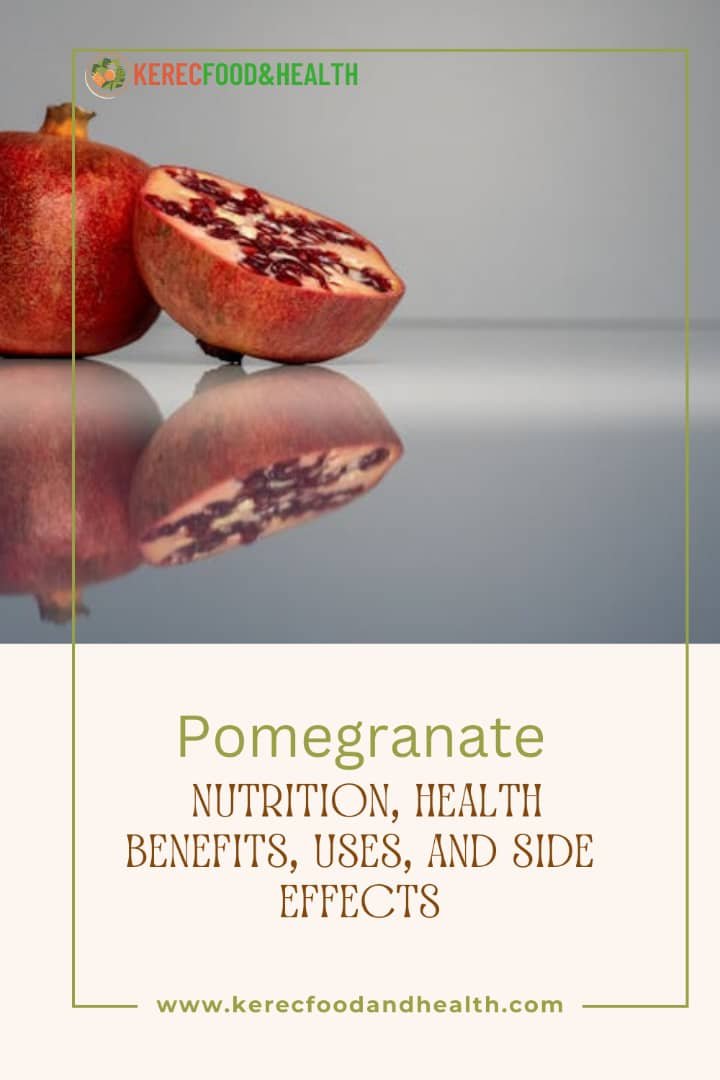What is Pomegranate
Pomegranates is a fruit that comes from the Punica granatum tree, which is native to the Mediterranean region. It is known for its unique appearance and rich red color.
The fruit is roughly spherical, about the size of an apple, with a thick and leathery outer skin. The skin is typically red, but can also be yellow or orange depending on the variety. Inside the fruit, there are many small, edible seeds called arils, surrounded by juicy, translucent flesh. Each seed is encased in a pulpy, red or pinkish membrane, which is the edible part of the fruit.
Pomegranate delights the palate with its sweet and tangy flavor. People often enjoy it fresh, but they also incorporate it into various culinary preparations, such as juices, smoothies, salads, sauces, and desserts. Furthermore, you can eat the arils on their own, or you can sprinkle them over dishes to add vibrant color and a burst of flavor. Additionally, pomegranate juice stands out for its vivid hue and numerous health benefits, making it a popular choice among health-conscious individuals.
In addition to its delicious taste, pomegranate is recognized as a highly nutritious fruit. It serves as an excellent source of vitamins C and K, as well as fiber and antioxidants, which are beneficial for protecting the body against damage from free radicals. Pomegranate offers several health benefits; for example, it may improve heart health, reduce inflammation, and potentially provide anticancer properties.
Overall, pomegranate is a versatile and delicious fruit that offers both culinary enjoyment and potential health benefits.
Pomegranate Nutrition
Pomegranates are highly nutritious and offer a variety of health benefits. Here’s a breakdown of their nutritional value per 100 grams of pomegranate arils (the edible seeds):
Nutritional Content
- Calories: Approximately 83
- Protein: 1.67 g
- Carbohydrates: 18.7 g
- Sugars: About 13.67 g
- Dietary Fiber: 4 g
- Fat: 1.17 g
Vitamins and Minerals
- Vitamin C: Approximately 10.2 mg (about 17% of the Daily Value)
- Vitamin K: Around 16.4 mcg (about 20% of the Daily Value)
- Folate: Approximately 38 mcg (about 10% of the Daily Value)
- Potassium: About 236 mg (about 7% of the Daily Value)
- Magnesium: Roughly 12 mg (about 3% of the Daily Value)
Conclusion
Incorporating pomegranates into your diet can provide beneficial nutrients and potential health benefits, making them an excellent addition to a balanced diet. Always consult with a healthcare professional or nutritionist for personalized dietary advice.
10 Most Powerful Health Benefits of Pomegranate
Pomegranate, with its ruby-red seeds and tangy-sweet flavor, is not just a delicious fruit; it’s a powerhouse of health benefits. Thanks to its rich antioxidant content and potential heart-protecting properties, this superfood has been celebrated for its numerous health benefits for centuries. Here are some of the health benefits associated with consuming pomegranate:
1. Antioxidant Richness
Pomegranates are rich in antioxidants, especially polyphenols, punicalagins, and anthocyanins. These compounds play a crucial role in combating oxidative stress and inflammation within the body.
The antioxidants in pomegranates contribute to the fruit’s anti-aging and disease-fighting properties. These compounds help protect the body against free radicals, which can cause damage to cells and contribute to chronic diseases such as heart disease, cancer, and inflammation.
2. Improves Heart Health
Research shows that pomegranate juice and extract positively impact heart health. Specifically, the high levels of polyphenols found in pomegranate juice are linked to enhancements in heart health.
Studies suggest that regular consumption may help lower blood pressure, reduce LDL (bad) cholesterol levels, and improve overall cardiovascular function.
3. Anti-Inflammatory Effects
Pomegranate contains natural anti-inflammatory compounds, which can help alleviate symptoms of chronic inflammation and related conditions. Chronic inflammation is linked to various health conditions, including heart disease, diabetes, and certain types of cancer. Consuming pomegranates may help lower inflammation markers in the body. This makes it a valuable addition to an anti-inflammatory diet.
4. Boost Immune System
Pomegranates are rich in vitamin C, which is essential for a healthy immune system. Vitamin C helps protect against common illnesses and supports the body’s ability to fight infections.
5. Nutrient Dense
In addition to its disease-fighting properties, pomegranate is a good source of essential nutrients, including vitamin C, vitamin K, and potassium, all of which play vital roles in supporting overall health.
6. Digestive Health
Pomegranates are a good source of dietary fiber, which aids in digestion and promotes regular bowel movements. The fiber content of pomegranate can support healthy digestion, regulate bowel movements, help prevent conditions like constipation and diverticulitis.
7. Cancer Prevention
Emerging research indicates that pomegranate extract may inhibit the growth of certain cancer cells, particularly in relation to breast and prostate cancers. Some studies suggest that pomegranates may help prevent certain types of cancer, including breast and prostate cancer. Researchers believe that the fruit’s antioxidant and anti-inflammatory properties, along with its ability to inhibit cancer cell growth and promote apoptosis (cell death), contribute to these potential anti-cancer effects.
8. Cognitive Function
Pomegranates may have a positive impact on brain health and cognitive function. Studies suggest that the fruit’s high antioxidant content can help protect brain cells from damage and improve memory and overall brain function.
9. Skin Health
Pomegranates are thought to positively impact skin health due to their rich antioxidant content. These antioxidants help protect the skin from damage caused by UV rays and environmental pollutants.
The fruit’s anti-inflammatory properties may also contribute to reducing skin inflammation and promoting a youthful complexion.
Conclusion: Pomegranate offers a myriad of health benefits, making it a valuable addition to a well-rounded, health-conscious diet. From its potent antioxidant content to its potential role in supporting heart health and fighting inflammation, this vibrant fruit deserves its status as a superfood. Embrace the power of pomegranate and unlock its numerous health advantages for a vibrant, thriving life.
While pomegranate offers potential health benefits, it’s important to recognize that individual responses may vary. Therefore, you should consume it as part of a balanced diet. If you have specific dietary concerns or existing health conditions, I recommend consulting with a healthcare professional or registered dietitian for personalized advice.
Incorporating Pomegranate into Your Diet
To reap the health benefits of pomegranate, consider adding the fruit to your diet in various ways. Whether it’s enjoying the seeds on their own, adding them to salads, or sipping on freshly squeezed pomegranate juice, there are numerous delicious ways to incorporate this nutritious fruit into your daily routine.
Uses Of Pomegranate
Pomegranate is a versatile fruit that can be used in various ways. Here are some common uses of pomegranate:
1. Fresh Consumption
Pomegranate seeds, also known as arils, are often enjoyed fresh. The seeds have a juicy and tart-sweet flavor.
They can be eaten on their own as a snack or added to salads, yogurt, smoothies, or oatmeal for an extra burst of flavor and texture.
2. Juices and Drinks
Pomegranate juice is widely consumed for its refreshing taste and potential health benefits.
It can be enjoyed on its own or mixed with other juices or sparkling water to create flavorful beverages.
Pomegranate syrup, made from reduced pomegranate juice, is another popular ingredient for cocktails and mocktails.
3. Cooking and Baking
Pomegranate arils can be used as a garnish, added to savory dishes like salads, grain bowls, and roasted vegetables to add a pop of color and tangy flavor.
Pomegranate juice or syrup can be used as a marinade or glaze for meats, or as an ingredient in sauces, dressings, and desserts.
4. Smoothies and Smoothie Bowls
Pomegranate seeds or juice can be blended into smoothies for a refreshing and nutritious addition.
The vibrant color and tangy taste of pomegranate add a delightful twist to any smoothie combination. Pomegranate seeds can also be used as a topping for smoothie bowls.
5. Jams, Jellies, and Sauces
By cooking pomegranate down with sugar and other ingredients, you can create flavorful jams, jellies, and sauces. You can then use these delightful creations as spreads or toppings, or as accompaniments for a variety of dishes, including toast, pancakes, meats, and desserts.
6. Desserts
Chefs frequently use pomegranate in desserts because of its unique flavor and vibrant color. You can sprinkle the arils over ice cream, puddings, or cakes, and you can also mix them into fruit salads.
Additionally, pomegranate juice serves as a key ingredient in refreshing treats like sorbets, popsicles, and gelato.
7. Extracts and Supplements
Pomegranate extracts and supplements, such as capsules or powders, are available and often taken for their potential health benefits like antioxidant properties and potential cardiovascular support.
However, it’s crucial to consult with a healthcare professional before using any supplements.
8. Cocktails
Pomegranate juice can be a delicious addition to cocktails and mocktails, adding both flavor and a vibrant color.
In addition to its culinary uses, pomegranate holds cultural and symbolic significance in various traditions. People often incorporate it into decorations, rituals, and celebrations, highlighting its importance in those contexts.
Remember to choose ripe and fresh pomegranates with firm skin for the best taste and quality. Extracting the arils from the fruit can be a bit challenging, but there are various techniques available online to make the process easier.
Side Effect of Pomegranate
Although pomegranate is generally safe for consumption and most individuals tolerate it well, some people may experience a few potential side effects.
1. Allergic Reactions
Although rare, some individuals may be allergic to pomegranate. Allergic reactions can manifest as skin rashes, itching, swelling, or difficulty breathing. If you have a known allergy to pomegranate or other fruits, it is best to avoid consuming it.
2. Digestive Issues
Pomegranate contains natural sugars and dietary fiber. While fiber is generally beneficial for digestion, excessively consuming it can lead to gastrointestinal discomfort, such as bloating, gas, or diarrhea. It is important to consume pomegranate in moderation, especially if you have a sensitive digestive system or a pre-existing digestive condition.
3. Drug Interactions
Pomegranate juice and supplements can interact with certain medications. Pomegranate may interfere with the metabolism of some drugs in the liver, potentially increasing or decreasing their effects. If you are taking any medications, it is advisable to consult with your healthcare provider to ensure there are no interactions.
4. Blood Pressure Interactions
Pomegranate juice may lower blood pressure. While this can be beneficial for most people, individuals with low blood pressure or those already taking blood pressure medication should exercise caution. It is important to monitor blood pressure levels and consult a healthcare professional if you have any concerns.
5. Oxalate Content
Pomegranate contains oxalates, naturally occurring compounds that can contribute to the formation of kidney stones. If you are prone to kidney stones, it may be recommended to moderate your pomegranate consumption. Drinking plenty of water alongside consuming pomegranate can help mitigate this risk.
It’s essential to note that these side effects are generally uncommon and the benefits of consuming pomegranate often outweigh the risks for most individuals. However, it is always wise to consume pomegranate in moderation and consult a healthcare professional if you have any specific concerns or a pre-existing medical condition.





